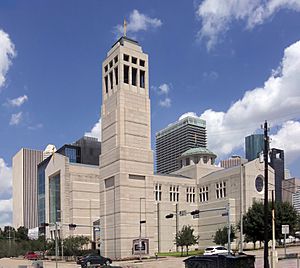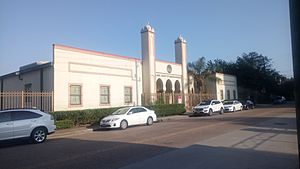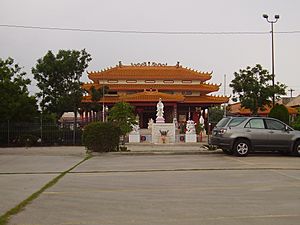Religion in Houston facts for kids
| Religious affiliation (2020) | ||||
|---|---|---|---|---|
| Christian | 72% | |||
| Protestant | 40% | |||
| Catholic | 29% | |||
| Other Christian | 3% | |||
| Unaffiliated | 21% | |||
| Muslim | 2% | |||
| Jewish | 1% | |||
| Buddhist | 1% | |||
| Hindu | 0.5% | |||
| Other faiths | 1.5% | |||
Houston, Texas, is a city with a rich mix of cultures and people. Because many different groups have moved here, Houston has become home to a wide variety of religions. For a long time, Protestant Christianity was the main religion in this part of Texas, known as the "Bible Belt." But over the last 50 years, many new faiths have grown in the city.
A study in 2014 found that most Houstonians, about 73%, were Christians. This included 50% who were Protestant and 19% who were Roman Catholic Christian. About 20% of people said they had no religious connection. Other religions like Judaism, Buddhism, Islam, and Hinduism made up about 7% of the population. By 2020, a different study showed that 72% of people were Christian, with 40% Protestant and 29% Catholic. The number of people with no religion was 21%. Muslims and Jews were the largest non-Christian groups.
Contents
Christianity in Houston
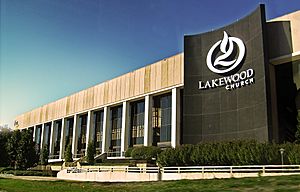
Christianity has been a part of Houston since the city was first settled. It remains the most common religion in Houston and the areas around it. In fact, Houston is considered one of the most Christian cities in the United States.
The Christian community in Houston is mostly made up of Protestants and Roman Catholics. In 2020, there were nearly 1.3 million Catholics in the Houston area. The next largest Christian group was Southern Baptists, with over 800,000 members. Many people also belong to non-denominational Protestant churches.
Lakewood Church in Houston is the biggest church in the United States. It's led by Pastor Joel Osteen. In 2010, about 44,800 people attended its services every week! Since 2005, the church has been located in the former Compaq Center sports stadium. Houston is also home to other very large churches, often called "megachurches," like Second Baptist Church Houston and Woodlands Church.
The Roman Catholic Archdiocese of Galveston–Houston is the largest Catholic area in Texas. It was started in 1847. By 2019, it had about 1.7 million Catholics. Its main church, called a co-cathedral, is in Houston. There are also other Catholic groups in the city, including Eastern Catholic churches.
Houston also has many Eastern and Oriental Orthodox churches. These churches serve immigrants from places like Eastern Europe, the Middle East, Ethiopia, and India. In 2020, there were over 16,500 Eastern and Oriental Orthodox Christians in Houston. The Greek Orthodox community is a big part of this group and even holds an annual Greek Festival.
The Coptic Orthodox community has grown a lot in Houston. In 2004, there were three Coptic Orthodox churches. The largest, St. Mary and Archangel Michael Church, was built for $2.5 million. Many Coptic families have moved to Houston over the years, especially from Egypt.
The Church of Jesus Christ of Latter-day Saints (LDS Church) also has a strong presence in Houston. In 2011, there were 58,200 members in Houston, with over 1,000 new members joining each year. The LDS Church has more than 32 Spanish-speaking groups in the city.
Judaism in Houston
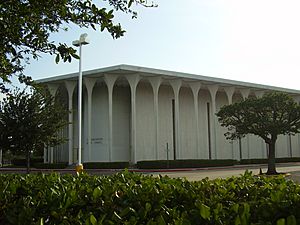
The first Jewish synagogue in Houston was the Orthodox Beth Israel Congregation, which opened in 1854. By 1987, about 42,000 Jewish people lived in the greater Houston area. The Meyerland community is often seen as a center for Jewish life in the city.
In 2016, a study found that 51,000 Jewish people lived in the area, which was an increase of 4,000 since 2001. By that year, there were over 40 synagogues in Houston. These included different types of Jewish communities, such as Conservative, Orthodox, and Reform Jews.
Islam in Houston
Houston has the largest Muslim community in Texas and the Southern United States. In 2012, it was estimated that Muslims made up 1.2% of Houston's population. By 2016, Muslims in Houston came from many different backgrounds, including South Asia, the Middle East, Africa, and Indonesia. There was also a growing number of Latino people who converted to Islam.
In 2000, there were over 41 mosques and religious centers in Houston. The largest was the Al-Noor Mosque. By 2020, there were an estimated 123,256 Muslims in the area. The two main branches of Islam, Sunni and Shia Muslims, generally get along well in Houston.
Buddhism in Houston
Buddhists started to establish themselves in Houston in the late 1970s. Many Vietnamese immigrants who came to Houston after the Vietnam War were Buddhist.
The Texas Buddhist Association (TBA) was founded in Houston in 1978. It helped Westerners understand Buddhism. The American Bodhi Center, a large property in Waller County, is part of the TBA. It has meditation halls and dormitories.
One of the first Buddhist places of worship, the Buddha Light Temple, opened in 1984. The Fo Guang Shan Chung Mei Temple is another important Buddhist temple in Stafford, Texas. The Dawn Mountain Tibetan Temple, a Tibetan Buddhist center, is located in Montrose. The Houston Zen Center practices Sōtō Zen Buddhism. In 2020, there were 20,281 Buddhists in the Houston area.
Taoism in Houston
The Texas Guandi Temple, a Taoist temple, is located in East Downtown Houston. It was built in 1999 by a Vietnamese couple who believed the Chinese god Guan Yu (Guandi) saved their lives during a robbery.
The temple's design and building materials came from China. It also has statues from Thailand. The temple welcomes people of all religions and is a place for quiet reflection.
Hinduism in Houston
The first Hindu center in Houston opened in 1969. Since then, the number of Hindus has grown a lot. As of 2016, there were about 120,000 Hindus in the Houston area. By 2020, another study estimated there were over 51,500 Hindus.
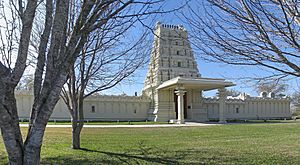
The Sri Meenakshi Temple in Pearland was established in 1979. It started small but grew to have much larger facilities by 1995.
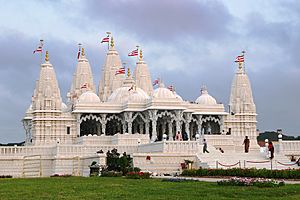
The BAPS Shri Swaminarayan Mandir Houston, a beautiful Hindu temple, is located in Fort Bend County. It was built with marble and limestone carved by 3,000 craftsmen in India. The pieces were shipped to Houston, and volunteers helped build the temple. It cost about $7 million to build by 2004.
Other Hindu temples include the Sri Saumyakasi temple in Sugar Land, which opened in 2007. The Hindu Temple of The Woodlands opened in 2011, serving Hindus in the northern part of Houston. In 2010, Indo-Caribbean Hindus built the Lakshmi Narayan Mandir of North Houston, which is known for its green practices like rainwater harvesting.
Sikhism in Houston
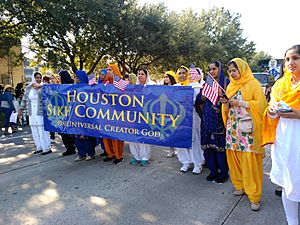
Sikh people in Houston first held religious services in their homes. In 1972, the Sikh Center of the Gulf Coast Area, the first dedicated Sikh worship center, was established. By 2016, there were about 7,000 to 10,000 Sikhs in Houston and seven gurdwaras (Sikh temples). Most Sikhs in the city come from the Punjab region of India.
The Gurdwara Guru Teg Bahadur Sahib Ji is a Sikh temple in Houston. The first Sikh police officer in Harris County, Sandeep Dhaliwal, was allowed to wear his Sikh articles of faith, including his turban and beard, while on duty.
Zoroastrianism in Houston
Zoroastrians began arriving in Houston in the 1970s. The Zoroastrian Association of Houston (ZAH) was formed in 1976. In the 1990s, the Zarathushti Heritage and Cultural Center opened in Southwest Houston.
As of 2016, there were 650 Zoroastrians in Houston. They built a fire temple, called Bhandara Atash Kadeh, which opened in 2019.
Baháʼí Faith in Houston
The Houston Baháʼí Center is a Baháʼí organization. Many members are refugees from Iran, where their families faced challenges because of their faith. In 2010, there were about 14,000 Baháʼí members in the entire state of Texas.
Jainism in Houston
Houston's Jain population started growing in the 1970s. Jain Vishva Bharati (JVB) Houston, a Jain organization, began around 1999. In 2009, the JVB opened a $2 million meditation center in west Houston. It includes a large meditation hall and offers Sunday school classes.
The Jain Society of Houston also has a temple in west Houston. In 2011, there were about 1,000 Jain families in the city.
Yazidism in Houston
As of 2016, Houston had a group of Yazidis who practiced their religion. The Yazda Global Yazidi Organization, a worldwide Yazidi group, has its headquarters in Houston.
Other Religious Groups
The Church of Scientology operates a mission in Houston.
The group Houston Atheists, for people who do not believe in a god, had 1,400 members in 2011. Their membership doubled in just two years.
In the 1970s, the First Pagan Church was located in Montrose, Houston.
 | Leon Lynch |
 | Milton P. Webster |
 | Ferdinand Smith |


